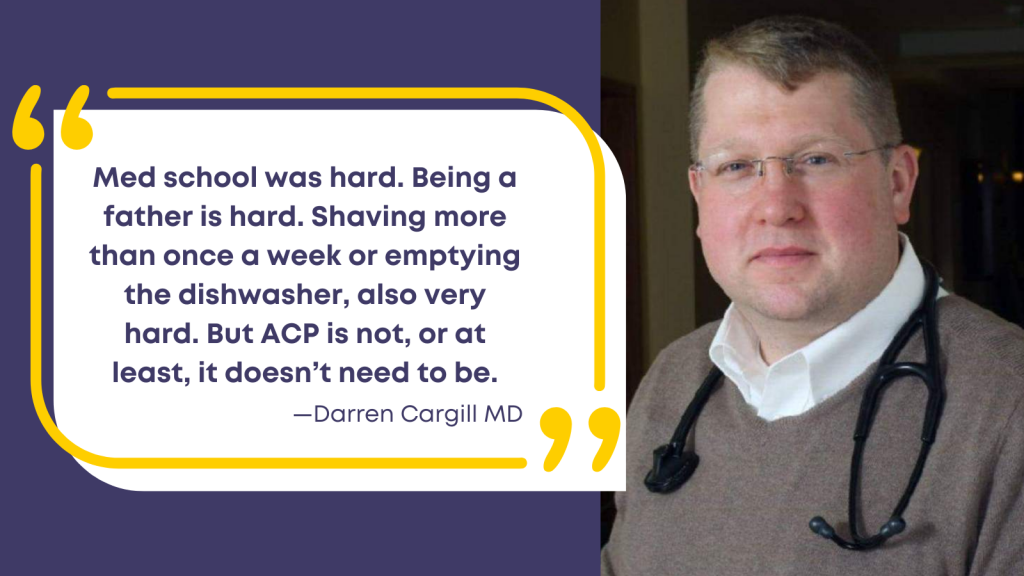by Darren Cargill
Like many of you, I took to social media during the pandemic for many reasons: entertainment, information, escape, connection, troll-hunting…
One of the true gems on social media during the pandemic came in the unlikely form of Brittlestar.
Stewart Reynolds, aka Brittlestar, was one such in-ter-ape, a blend of information, entertainment and escape. His short videos on twitter became must-watch viewing. As the pandemic dragged, he encouraged Canadians to be kind, lifted us when spirits were down, helped the vaccine hesitant and provided a much need laugh when things looked darkest before the light.
So what does this have to do with Advance Care Planning (ACP) in Canada?
For decades, we have known about the benefits of ACP.
According to Advance Care Planning Canada, “Advance care planning is a process of reflection and communication, a time for you to reflect on your values and wishes, and to let others know your future health and personal care preferences in the event that you are unable to consent or refuse treatment or other care.”
So let’s start by breaking it down:
Advance: Do it now, not later.
Care: Refers to how you want to be cared for
Planning: Means having a plan
Simple right? Well, a recent Nanos report shows that while more Canadians are engaging in these type of discussions, many Canadians still feel that:
- ACP is complicated
- ACP is difficult to talk about
- ACP is important but have not spoken to a health care provider about it.
So why are patients not engaging in more ACP discussions?
The answer is: ACP has a public relations issue.
So, what can we learn from Brittlestar?
People like to laugh. They say laughter is the best medicine, after all. Some of the best and funniest patient encounters I have ever had have been with patients discussing death and dying. I mean tears flowing, belly aching laughter.
How do we fix ACP’s PR problem?
Why not take more of a “public health approach” to ACP? We have seen great examples during the pandemic. Take for instance Ottawa Public Health. A hilarious social media campaign helped educate Ottawa and the rest of Canada about COVID, the need for masking, social distancing, the benefits of vaccination and how to engage in safe sex without wearing a full biohazard suit.
Good job, Bruce: The guy behind North America’s top public health Twitter account – Macleans.ca
You can follow them at: @OttawaHealth
http://phpci.info/public-health-approach
If we can teach people to have sex and not catch COVID, why can’t we teach them about the benefits of advance care planning?
The time has come to try a different approach.
So just like Kathy Kortes-Miller’s book tells us that “Talking about death won’t kill you,” neither will advance care planning unless you do it in the bathtub while making toast. And maybe we can have some fun while we are at it.
Med school was hard. Being a father is hard. Shaving more than once a week or emptying the dishwasher, also very hard. But ACP is not, or at least, it doesn’t need to be.
Planning ahead also takes stress off family and friends who may struggle if they do not know what a loved one’s wishes are or who should be even be making these decisions during a time of stress and uncertainty.
Let’s be serious for one moment. If caring for patients at the end of life has taught me anything, it is the bravery and grace they model for the rest of us. The vast majority of people (but not all) want to talk about their beliefs, wishes and values around health care, they just need to know we are open to having these discussions and that we will be there with them through the good times and the inevitable bad times too. Is that too much to ask?
Sardonically submitted and positively deviant,
Darren Cargill MD
Windsor, ON
Dr. Darren Cargill is a fellow of the College of Family Physicians of Canada, the Royal College of Physicians of Canada, and American Association of Hospice Palliative Medicine. He is the medical director for the Hospice of Windsor and Essex County and lead physician for its community-based Palliative Medicine Program. He is one of only two certified hospice medical directors in Canada and has his designation as a certified Canadian physician executive. He serves on the board executive of the Canadian Society of Palliative Care Physicians (CSPCP).

